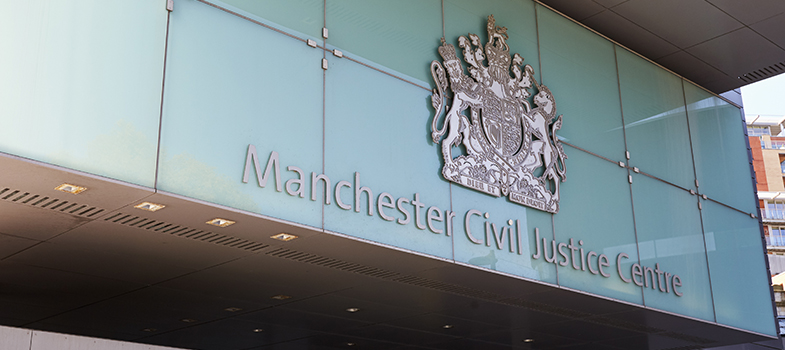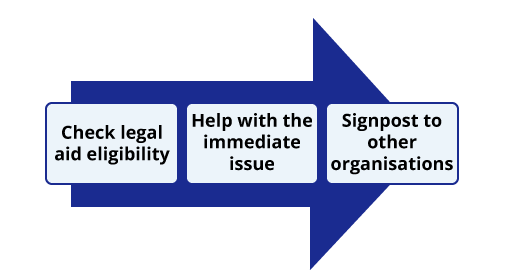2.3 How to help a client who is experiencing or has experienced domestic abuse
In this section we will look at a simple to follow process that you can apply to your work with clients who are survivors of domestic abuse. There is a three stage process for supporting a client who has experienced domestic abuse.
Check for legal aid eligibility
Whilst legal aid is not available for most civil and family cases, domestic abuse is one element of the legal aid criteria that means the client could be eligible for legal aid. One of the most important things you could do is to help the client get professional help. Generally, if they are a survivor of domestic abuse in receipt of benefits or on a low income then it is worth doing this as soon as you realise.
Obtaining legal aid is not a straightforward process and some clients who are in distress or experiencing trauma may avoid contacting solicitors as it feels too much for them. Support Through Court volunteers can help by explaining the process and by signposting to agencies who can carry out a legal aid assessment. It is important that volunteers do not ignore the option of legal aid as it will undoubtedly benefit the client in the longer term.
Activity 5
Imagine you are supporting a client who is very anxious. They are on a very low income and there is evidence of domestic abuse in their case. They have been told by a domestic abuse support agency that they should go to court to get a
You suggest the client tries to
Comment
Solicitors can give legal advice and represent the client in court. They can complete the application and statement and advise the client how to put their case in the most persuasive way. Legal aid can pay for any additional costs, for example drug and alcohol tests or the costs in obtaining police reports. Solicitors can arrange for service of orders and act as a point of contact for the other party.
Support Through Court can help if there is no other option, but as good as it is, our help is usually no substitute for professional legal representation. Notwithstanding this, clients have a choice as to whether they want to use a solicitor and volunteers should be sensitive and respect his.
Did you know?
You can check legal aid eligibility by using the government’s legal aid online checker [Tip: hold Ctrl and click a link to open it in a new tab. (Hide tip)] ,
Help with the immediate issue
If the client may be eligible for legal aid, resist the temptation to help them with the paperwork unless it is essential and until you have established what the client wishes to do with regard to a legal aid application. For example, you may need to assist them with an urgent application where no solicitor is immediately available to assist.
However, it is equally important that you don’t just send the client away. It may be useful to explain the procedures and to explain about special measures. Further information about special measures is at the end of this section.
If the client is not eligible for legal aid (for example, they may be on a medium or high income) you should support the client with the problem they have come in for, such as completing an application form or writing a statement. Whilst doing this it is important to remember our remit and that we should be client focussed and non-judgemental. Be careful not to collude with a client, whether they are a survivor or alleged perpetrator. It is important not to do this because it is unlikely that you will know for certain the full facts of the case. By colluding we go beyond our role and become over involved. This can be harmful to the client or the other party.
Signpost to other organisations
Remember, we can only do so much and can only help within the court building. There are local and national organisations which support domestic abuse survivors. You can give the client information about their local domestic abuse survivor support organisations (e.g. Women’s Aid). Your local council may also have information on their website about organisations which can help. Women’s Aid also maintain an online directory of local services
Activity 6
Thinking about your volunteering, what local organisations could you signpost domestic abuse survivors to and what information leaflets are available in your office to give to clients?
Comment
Your response will depend on your location and the Support Through Court office you volunteer at. If you are not aware of the support services available, ask the other volunteers in your office. Your service manager should be able to tell you what leaflets to give to a client.
Finally, if a domestic abuse survivor is involved with court proceedings involving the alleged perpetrator, they can request the court to provide special measures. This means the court will make special facilities available to help the survivor attend and take part in the court proceedings, such as providing screens in court, separate waiting areas and entrances or video appearances in court. When you deal with a case involving domestic abuse and court proceedings, remember to inform the client about the possibility of special measures. You can find out more in the Special measures module.
Activity 7
Please answer the following multiple choice questions. There is one correct answer for each question.
a.
Two
b.
Three
c.
Four
The correct answer is b.
Answer
The correct answer is three.
These are checking legal aid eligibility, helping with the immediate issue and signposting to other organisations.
a.
In all circumstances if they can evidence domestic abuse
b.
Never, legal aid is not available in family cases
c.
If they can evidence domestic abuse and have a low income or are on benefits
The correct answer is c.
Answer
The correct answer is if they can evidence domestic abuse and have a low income or are on benefits
a.
Special Measures
b.
None, they have to abide by the normal court rules
c.
It is at the discretion of the Support Through Court Service Manager.
The correct answer is a.
Answer
The correct answer is special Measures
2.2 What is domestic abuse?

